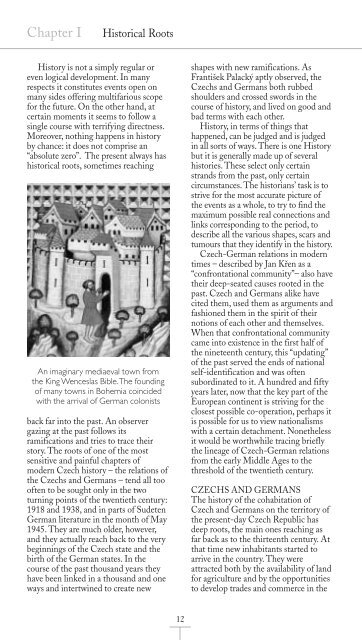the nationality of all inhabitants of the czech provinces and ...
the nationality of all inhabitants of the czech provinces and ...
the nationality of all inhabitants of the czech provinces and ...
Create successful ePaper yourself
Turn your PDF publications into a flip-book with our unique Google optimized e-Paper software.
Chapter I Historical Roots<br />
History is not a simply regular or<br />
even logical development. In many<br />
respects it constitutes events open on<br />
many sides <strong>of</strong>fering multifarious scope<br />
for <strong>the</strong> future. On <strong>the</strong> o<strong>the</strong>r h<strong>and</strong>, at<br />
certain moments it seems to follow a<br />
single course with terrifying directness.<br />
Moreover, nothing happens in history<br />
by chance: it does not comprise an<br />
“absolute zero”. The present always has<br />
historical roots, sometimes reaching<br />
An imaginary mediaeval town from<br />
<strong>the</strong> King Wenceslas Bible.The founding<br />
<strong>of</strong> many towns in Bohemia coincided<br />
with <strong>the</strong> arrival <strong>of</strong> German colonists<br />
back far into <strong>the</strong> past. An observer<br />
gazing at <strong>the</strong> past follows its<br />
ramifications <strong>and</strong> tries to trace <strong>the</strong>ir<br />
story. The roots <strong>of</strong> one <strong>of</strong> <strong>the</strong> most<br />
sensitive <strong>and</strong> painful chapters <strong>of</strong><br />
modern Czech history – <strong>the</strong> relations <strong>of</strong><br />
<strong>the</strong> Czechs <strong>and</strong> Germans – tend <strong>all</strong> too<br />
<strong>of</strong>ten to be sought only in <strong>the</strong> two<br />
turning points <strong>of</strong> <strong>the</strong> twentieth century:<br />
1918 <strong>and</strong> 1938, <strong>and</strong> in parts <strong>of</strong> Sudeten<br />
German literature in <strong>the</strong> month <strong>of</strong> May<br />
1945. They are much older, however,<br />
<strong>and</strong> <strong>the</strong>y actu<strong>all</strong>y reach back to <strong>the</strong> very<br />
beginnings <strong>of</strong> <strong>the</strong> Czech state <strong>and</strong> <strong>the</strong><br />
birth <strong>of</strong> <strong>the</strong> German states. In <strong>the</strong><br />
course <strong>of</strong> <strong>the</strong> past thous<strong>and</strong> years <strong>the</strong>y<br />
have been linked in a thous<strong>and</strong> <strong>and</strong> one<br />
ways <strong>and</strong> intertwined to create new<br />
12<br />
shapes with new ramifications. As<br />
František Palacký aptly observed, <strong>the</strong><br />
Czechs <strong>and</strong> Germans both rubbed<br />
shoulders <strong>and</strong> crossed swords in <strong>the</strong><br />
course <strong>of</strong> history, <strong>and</strong> lived on good <strong>and</strong><br />
bad terms with each o<strong>the</strong>r.<br />
History, in terms <strong>of</strong> things that<br />
happened, can be judged <strong>and</strong> is judged<br />
in <strong>all</strong> sorts <strong>of</strong> ways. There is one History<br />
but it is gener<strong>all</strong>y made up <strong>of</strong> several<br />
histories. These select only certain<br />
str<strong>and</strong>s from <strong>the</strong> past, only certain<br />
circumstances. The historians’ task is to<br />
strive for <strong>the</strong> most accurate picture <strong>of</strong><br />
<strong>the</strong> events as a whole, to try to find <strong>the</strong><br />
maximum possible real connections <strong>and</strong><br />
links corresponding to <strong>the</strong> period, to<br />
describe <strong>all</strong> <strong>the</strong> various shapes, scars <strong>and</strong><br />
tumours that <strong>the</strong>y identify in <strong>the</strong> history.<br />
Czech-German relations in modern<br />
times – described by Jan Křen as a<br />
“confrontational community”– also have<br />
<strong>the</strong>ir deep-seated causes rooted in <strong>the</strong><br />
past. Czech <strong>and</strong> Germans alike have<br />
cited <strong>the</strong>m, used <strong>the</strong>m as arguments <strong>and</strong><br />
fashioned <strong>the</strong>m in <strong>the</strong> spirit <strong>of</strong> <strong>the</strong>ir<br />
notions <strong>of</strong> each o<strong>the</strong>r <strong>and</strong> <strong>the</strong>mselves.<br />
When that confrontational community<br />
came into existence in <strong>the</strong> first half <strong>of</strong><br />
<strong>the</strong> nineteenth century, this “updating”<br />
<strong>of</strong> <strong>the</strong> past served <strong>the</strong> ends <strong>of</strong> national<br />
self-identification <strong>and</strong> was <strong>of</strong>ten<br />
subordinated to it. A hundred <strong>and</strong> fifty<br />
years later, now that <strong>the</strong> key part <strong>of</strong> <strong>the</strong><br />
European continent is striving for <strong>the</strong><br />
closest possible co-operation, perhaps it<br />
is possible for us to view nationalisms<br />
with a certain detachment. None<strong>the</strong>less<br />
it would be worthwhile tracing briefly<br />
<strong>the</strong> lineage <strong>of</strong> Czech-German relations<br />
from <strong>the</strong> early Middle Ages to <strong>the</strong><br />
threshold <strong>of</strong> <strong>the</strong> twentieth century.<br />
CZECHS AND GERMANS<br />
The history <strong>of</strong> <strong>the</strong> cohabitation <strong>of</strong><br />
Czech <strong>and</strong> Germans on <strong>the</strong> territory <strong>of</strong><br />
<strong>the</strong> present-day Czech Republic has<br />
deep roots, <strong>the</strong> main ones reaching as<br />
far back as to <strong>the</strong> thirteenth century. At<br />
that time new <strong>inhabitants</strong> started to<br />
arrive in <strong>the</strong> country. They were<br />
attracted both by <strong>the</strong> availability <strong>of</strong> l<strong>and</strong><br />
for agriculture <strong>and</strong> by <strong>the</strong> opportunities<br />
to develop trades <strong>and</strong> commerce in <strong>the</strong>


